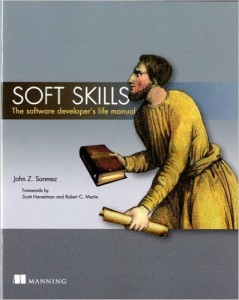Market Yourself
Want to score your dream job and go work for Google, Netflix, Amazon, Github, and the like? The big question: “How do I do it?”
Market yourself, of course!
What do these companies want?
These companies only hire the best of the best. But what does that really mean? You may see some of the following traits on job postings or you may pick them up from the people who already work at these companies:
- Continuous improvement
- Feedback/data driven
- Solve the toughest/biggest problems
- Extremely collaborative
- Intuitive
“I’ve got all of those traits! I should have no problem getting hired”.
Sure, you may be qualified, but how do you stand out from the person beside you who’s as qualified as you are? There are plenty of methods that can make you stand out in the minds of recruiters, hiring managers, and even high level employees of the company.
Market Yourself
Marketing is the action of promoting and selling products or services
Marketing yourself is therefore promoting and selling your skills and providing value to a company.
Standing out from the crowd involves work! I listened to an excellent podcast from Software Engineering Radio titled SE Radio Episode 245: John Sonmez on Marketing Yourself and Managing Your Career. John provided some helpful methods on standing out from the crowd, getting noticed by the people who can help you get your dream job, and useful tips on managing your career to make it the best it can be.
A few of the methods mentioned in the podcast are listed below:
- Get a blog and write a post every week
- Specializing your career
- Attending/presenting at meetups
- Interact with the blogs/social media of developers at the target companies
- Contribute to open-source projects
The bottom line is to be passionate about everything you do. When you’re giving off that vibe, others can’t help but notice the energy and detail put into everything: blog posts, conversations, presentations… the list is endless. More people remember an enthusiastic person than someone who’s not interested in what they’re talking about. Being detailed in your work is the bare minimum. Expression is key.
Blogging
Writing is one of the best mediums for sharing information. Blogging has the lowest barrier of entry. There is a huge and rich amount of content out there on anything and everything, especially in tech. Ideas are thrown back and forth, constantly iterated, all the while being kept around for others to read years later. One person’s blog post today is another person’s learning opportunity later. Read Why You Should Write Blogs by Steve Yegge for a deeper understanding of this powerful medium.
WordPress.com or Blogger are great services to get going. If you’re more technical, you can use GitHub Pages or even host your own. At the end of the day it doesn’t matter where it’s hosted or that you have a fancy domain name; all that matters is the content and what the readers get out of it.
Your blog can be about anything. I like writing about topics surrounding software development, both involving hard and soft skills. Having a prospective company see you go into depth on various topics gives them more confidence that you’re the right person for the job. Blogging also hones in your understanding of the topic you’re writing about and, over time, improves your communication skills.
There’s only so many people you can talk to. Writing allows you and your ideas to spread without limits.
Specializing
It’s best to be a specialist. Who’s going to receive a larger salary and gain more attention: a Fault-tolerant Docker Microservices Engineer or a Software Developer? Definitely the Fault-tolerant Docker Microservices Engineer.
Lets say I write a lot about fault-tolerant Docker microservices. To visitors of my website they can see that I know a lot about fault-tolerant Docker microservices. From now on they’ll associate me with being very informative and skilled in things fault-tolerant Docker microservices. Once the viewers have an understanding that I’m skilled in fault-tolerant Docker microservices I can expand to writing a lot about Docker microservices in general. I can then be known by others as the guy who knows a lot about Docker microservices. As time goes on and I become more popular I can expand to all of Docker and be known as the Docker guy.
Start small and specialize in a certain area. Its easier to stand out that way since you’re up against less and less people. Once people notice that you’re a specialist for subject X, the association will stick. From then on you can use this to your advantage. Say the company you’re wanting to work at is hiring for the job you’re specializing in. If people from the company know that you’re skilled in this subject they can recommend you to the hiring managers. You can use this tactic with some of the others listed here to get recommended by the employees of the company.
Attending Meetups
Going to a meetup and striking up a conversation with other attendees leaves a (hopefully) positive view of you on them. This is pretty much networking. In the podcast, John Sonmez stated that it is important to have a conversation with the individual without bugging them to help you get a job when you first meet. Meeting these people months before actually asking for their help to get a job improves your chances greatly since you’ve already met the person. It’s even better if you offer to help them. Then they’re more than likely to help you out and do whatever to pay you back.
Performing a talk at a meetup or conference is a great way to get noticed. The meetup or conference does a lot of the marketing for you already! Your name and title of the talk is advertised both at the venue and online. After the event a lot of references to you and the talk are put on the event’s website, YouTube recordings of your talk and news blogs. The viewers are trying to get as much useful information out of your talk. You have to prove that you have useful information. You’ll want to hook your viewers into wanting more information. At the beginning and end of the presentation you can mention your contact information (email, Twitter, GitHub, website..) and even offer a link where the viewer can go to get more information.
In the presentation, including links to extra materials can send those viewers to your blog, GitHub, or wherever else. Mentioning that you do consulting or are looking for an employer (only if you don’t have one!) puts the word out there since it can’t hurt.
Other Blogs and Social Media
Following and having useful conversations on the blogs of employees at the company you’re trying to get into, as well as the blogs of others in the same tech community gets you noticed over time. When a company is in the process of hiring, the employees can vouch for your skills, immediately putting you ahead of other candidates. If things go really well, the company can straight out offer you a position, bypassing the interview, giving you the upper hand at negotiating your salary, benefits and anything else.
Contribute to Open Source
Working on open source projects is one of the new contenders of things that tech companies are looking for in a developer. Its been proven by some companies already that they hire based on your GitHub profile. Contributing to an open source project or two shows that you’re capable of remotely working and good at collaborating with others. It also allows the hiring managers and recruiters to look at the code you write (eg. code style, design), something not shown on a resumé.
Even better, contributing to an open source project belonging to the company that you’re trying to get a job with looks very impressive when they start looking for candidates. If they can see all the contributions that you’ve made to their open source projects, it’ll look amazing since your skills have already shown business value. The company can more easily see the value you would bring to the software that they develop.
Working on your own side projects is always beneficial. It shows that you are creative and intuitive at solving your own problems and have the drive to make things better where you see fit.
Hacking the Interview
A few tricks were mentioned around hacking the interview. One of them mentioned earlier, is for the company to want to hire you right off the spot, bypassing the interview entirely. This could mean that you’ve received a recommendation from someone or your personal marketing has worked! This situation is pretty hard to get so the next tip is one we can all use to positively affect our interview outcome.
Another smart trick involves requesting “just five minutes to chat” sometime before the interview. Either over the phone or in person, this conversation allows you to talk freely with the interviewer to find out more about them and the company, including talking about yourself. Once your interview time comes along, the edge is already off since you’ve talked with the hiring manager already. Humans can be biased when it comes to mostly objective tasks such as finding the best candidate for a job. Once you get the interviewer to like you, they work in your favour, often weighing the candidates they like over others.
The Book
 Mentioned in the podcast, John Sonmez has published a book titled Soft Skills: The software developer’s life manual which sounds like a must read. He raises the point that the chapters are short, allowing for ~5 minute start-to-finish reads. There are 71 chapters in total, organized into seven sections. The section list is as follows:
Mentioned in the podcast, John Sonmez has published a book titled Soft Skills: The software developer’s life manual which sounds like a must read. He raises the point that the chapters are short, allowing for ~5 minute start-to-finish reads. There are 71 chapters in total, organized into seven sections. The section list is as follows:
- Career
- Marketing Yourself
- Learning
- Productivity
- Financial
- Fitness
- Spirit
I haven’t read the book yet, but I definitely will soon. I’m happy that I’m on the right track so far for my personal marketing based on the sections of this book. Besides the book sounding very helpful, you can’t knock the five stars and 178 reviews on Amazon.com!
Conclusion
It’s not an effortless path. Putting in the time and effort over months or years to market yourself gives big returns in the form of giving you more potential, allowing you to make the most of your career.
Take charge of your career. Follow your aspirations and make it count! I certainly will.
